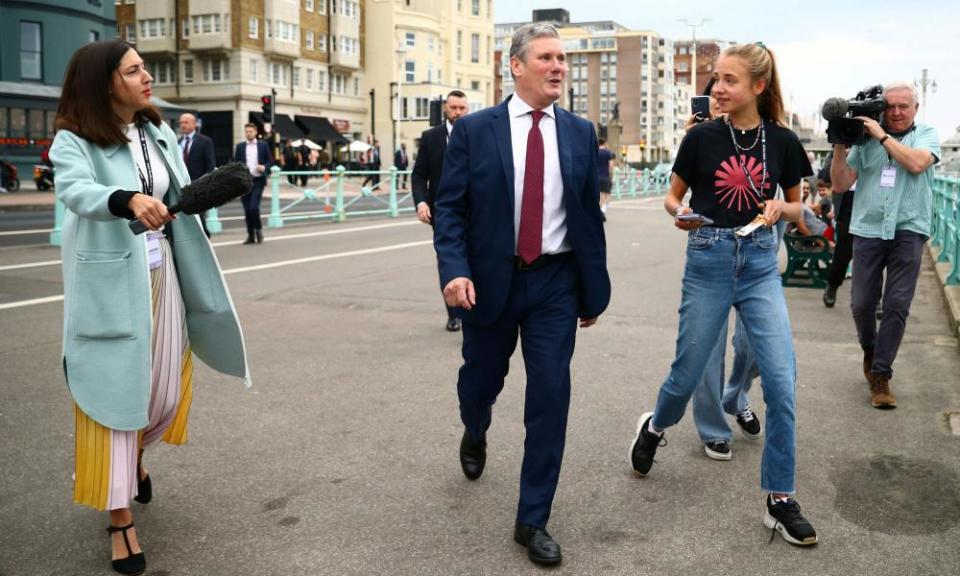Democracy is dead in Keir Starmer’s Labour

In recent weeks, I have been wearing a badge of honour. I have joined the ranks of those expelled or suspended from the Labour party. My crime? To have supported a group, recently proscribed, who oppose unjustified expulsions from the party. This is the reality of Keir Starmer’s purge.
Even before Starmer’s current, ill-judged plans to weaken the influence of the rank and file, he was waging a campaign to silence dissent and drive out many thousands of members. One of his frontbenchers gave the game away when he boasted: “He [Starmer] has locked out the hard left.”
Democracy in the Labour party is now dead. Starmer’s leadership has seen new rules invented and applied retrospectively and constituency parties de facto suspended, their elected officers removed and replaced by reliable rightwingers. Candidates for elections are imposed from the centre, regardless of local wishes. Motions critical of Starmer or supporting his predecessor, Jeremy Corbyn, are ruled out of order, and constituency party chairs who allow them to be debated are suspended. You cannot criticise Starmer’s leadership, and you cannot criticise the fact that such criticism is not allowed.
Dedicated activists with many years in the party have been harassed and driven out, angry, exhausted and in despair.
Such calculated brutality in the party is unprecedented. Yet the media, usually so obsessed with Labour splits, stays silent. Columnists talk of Starmer putting Labour’s “house in order”. Some order! Estimates of how many have left the party since he became leader are between 100,000 and 150,000: many kicked out, the majority walking away in disgust.
Starmer promised unity, knowing all along he would declare war on the left. Some were taken in by his 10 pledges promising to continue Labour’s “radical work” and to keep Labour’s commitments to common ownership. As his weasel words on nationalising the big six energy firms revealed, he has reneged on these promises already. He embraced Corbyn in the 2019 election before putting a knife in his back at the first opportunity.
From the moment Corbyn became leader, the right wing was hellbent on getting him out. Its sense of entitlement was outraged to see him at the top of the party, and that was compounded when he, John McDonnell and close allies developed a programme that would have begun the transformation of society in the interests of the working class.
The wider establishment was horrified. Its anxiety increased when Labour nearly won the 2017 election on a radical agenda. Something had to be done; the party had to be “sorted out”. The weapon used was the toxic allegation that Corbyn had made antisemitism endemic in the party. The assassins were sitting alongside him, his fellow Labour MPs.
It was under the cloak of claiming to rid the party of antisemitism that Starmer and his New Labour advisers have abused the party rulebook to threaten and expel so many. Jewish Voice for Labour reports a purge of leftwing Jewish members, and claims that they are four times more likely to face “actioned complaints’” than non-Jewish members. Their own complaints of mistreatment within the party have gone unanswered. What an irony.
Now all memory of Labour’s recent radicalism is to be wiped out. Corbyn is rarely heard, while Tony Blair’s aides and speechwriters are trotted out as political sages, despite their roles as apologists for privatisations and an illegal war.
For the Labour right, success in elections comes from reassuring the ruling class that its wealth and power are safe in Labour’s hands. The left must be reduced to its customary role of marching, demonstrating, a political sideshow. Rupert Murdoch will put his arm round Starmer or his successor, as he did with Blair.
Can the left respond? How can we achieve the structural change so desperately needed? The many who were inspired by Corbyn are still here, both inside and outside the party. There is a resurgent left presence in the unions. There are so many campaigns – against racism and austerity, to protect the NHS and the environment – a long list that shows how dissatisfied we are with present society.
So many yearn for a world where the common good transcends private greed, and all can look forward to lives of security and dignity. This is a moment of opportunity, but if it passes and we do not keep all these elements together, the left will fragment again and descend into sectarianism. Hundreds of thousands will remain politically homeless.
A new party would face the same difficulties as in the past. But we need a new initiative – a broad, inclusive, independent labour movement that unites those both in and outside the Labour party. It should be led by people who are recognised, principled and trusted, and the support of left unions would be critical.
We have a wealth of talent: young activists, rising politicians, academics, medics and economists, as well as great leaders in the communities and grassroots organisations. They understand all too well what is happening and speak with clarity and passion.
Such a movement must stand on principles that get to the root of our problems. I joined Labour in 1964 and the words on my original party card are still a good beginning: “To secure for the workers by hand or by brain the full fruits of their industry … upon the basis of the common ownership of the means of production, distribution and exchange.” What are we waiting for?
• Ken Loach is a film director

 Yahoo Finance
Yahoo Finance 